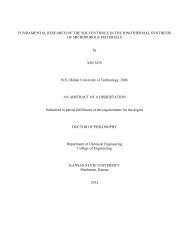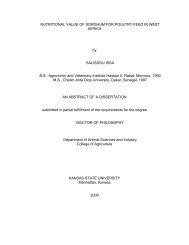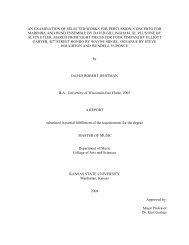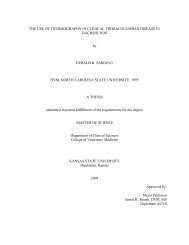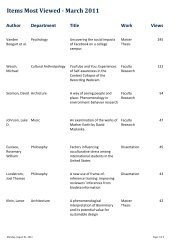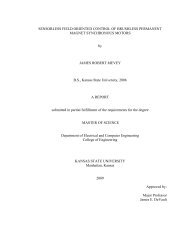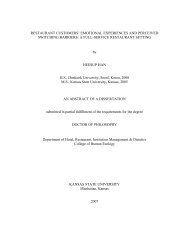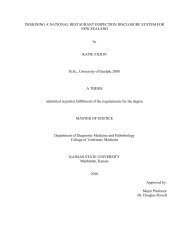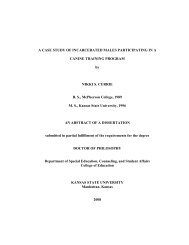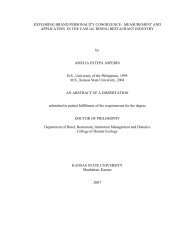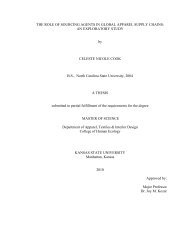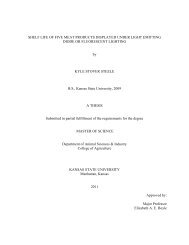SELFISH INTENTIONS - K-REx - Kansas State University
SELFISH INTENTIONS - K-REx - Kansas State University
SELFISH INTENTIONS - K-REx - Kansas State University
You also want an ePaper? Increase the reach of your titles
YUMPU automatically turns print PDFs into web optimized ePapers that Google loves.
What is abundantly clear from the New England record is that women were more likely<br />
to take advantage of the possibilities for divorce than were men. Records from the 1620s to the<br />
turn of the 18 th century in six New England colonies (Massachusetts Bay, Plymouth Rock, New<br />
Hampshire, Connecticut, New Haven, and Rhode Island) show that women petitioned for<br />
divorce two-thirds of the time. Specifically, men petitioned for divorce thirty-one times while<br />
women petitioned sixty-seven times. 19 In these petitions the primary cause listed for the divorce<br />
differed between the male and female petitioners. The primary cause in cases petitioned by men<br />
was adultery, while in cases that were petitioned by women, desertion was the most common<br />
reason given. 20 Women petitioning for divorce looked to escape from poverty or abuse, while<br />
men cited their wives’ infidelity or rebellion against their patriarchal authority in their petitions. 21<br />
Of all the colonies, the Southern colonies were the most conservative. These colonies<br />
were dominated by the practices of the Church of England which did not allow absolute divorce<br />
for any reason. These colonies did, however, break from Anglican church law by allowing<br />
chancery courts, which Glenda Riley defines as “separate courts of equity that adjusted cases<br />
overlooked by common law and statutes,” to grant limited divorces or what was commonly<br />
referred to as a “divorce from bed and board,” or what would now be referred to as a legal<br />
separation. 22 The grounds for granting limited divorces were limited to adultery, desertion, and<br />
extreme physical cruelty. South Carolina and Virginia, for example, only allowed couples the<br />
option of annulment or permanent separation. Spouses in Maryland could use the chancery court<br />
to obtain a separation only if they could prove extreme cruelty or abandonment had occurred. In<br />
19<br />
Additionally during this period, twenty-one people petitioned for either an annulment or legal separation from<br />
their spouse.<br />
20<br />
Phillips, 243.<br />
21<br />
VanBurkleo, 15.<br />
22<br />
Glenda Riley, “Legislative Divorce in Virginia, 1803-1850,” in Journal of the Early Republic, Vol. 11, No. 1<br />
(Spring, 1991), 51-52.<br />
5



